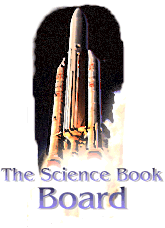![]()
 |
|
|
|
If you wish to purchase further titles already reviewed here, please return each time to SBB. Using the direct links available at our site is easier than searching by title, author, or ISBN number.
EDITORIAL INFORMATION Galileo's 1632 book, Dialogue on the Two Chief World Systems, Ptolemaic and Copernican, comes alive for twentieth-century readers thanks to Maurice Finocchiario's brilliant new translation and presentation. Condemned by the Inquisition for its heretical proposition that the earth revolves around the sun, Galileo's masterpiece takes the form of a debate, divided into four "days," among three highly articulate gentlemen. Finocchiario sets the stage with his introduction, which not only provides the human and historical framework for the Dialogue but also admits the reader gracefully into the basic non-Copernican understanding of the universe that would have been shared by Galileo's original audience. The translation of the Dialogue is abridged in order to highlight its essential content, and Finocchiario gives titles to the various parts of the debate as a guide to the principal topics. Galileo on the World Systems is a remarkably nuanced interpretation of a classic work and will give readers the tools to understand and evaluate for themselves one of the most influential scientific books in Western civilization. (Extracted from the press release)
GENERAL TABLE OF CONTENTS
OUR REVIEW Galileo on the World Systems contains a new commented translation of the classical work by Galileo Dialogue on the Two Chief World Systems, Ptolemaic and Copernican. Maurice A. Finocchiaro, a professor of Philosophy at the University of Nevada, Las Vegas, is the author of this scholarly adaptation. Its value is incalculable for the students of the history of science in general and of astronomy in particular. Although this is an abridged version of the original of the seventeenth century, it maintains all the important points and allows Finocchiario to include numerous commentaries without making the work into a too extensive product. In his work, Galileo makes a perfect exercise of critical thought. Finocchiario makes an effort to emphasize this aspect of this notorious scientist, also known as the "art of reasoning", and which is the basis of the advances of this Italian personality and of his revolutionary contributions to the astronomical science and cosmology. Thanks to the comments included in the book, we will understand Galileo's work much better, and we will be able to criticise it as well as assimilate it for what it is: a masterpiece of scientific literature. The first 70 pages, devoted to an introduction in which Finocchiario sets the historical clues of the Copernican problem and of the "Galileo" case, will serve as well to contemplate the Dialogue from a philosophical perspective. After an in-depth examination of the pages left by Galileo, the book ends up with the usual appendixes, glossary and bibliographical notes. |
|||
![]()
Main Page | What's New | Reviews | Indexes | Links